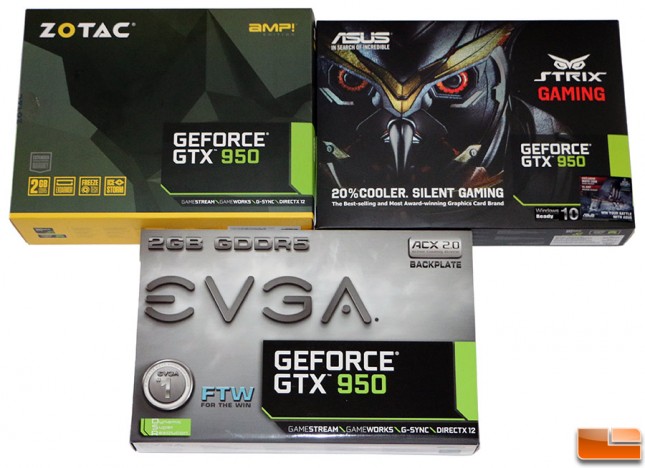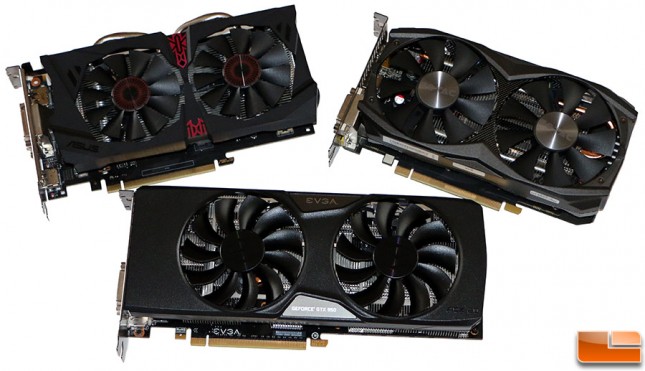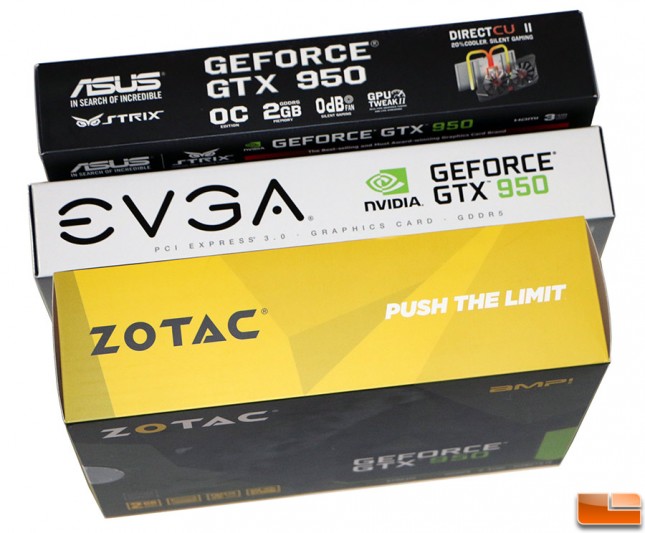NVIDIA GeForce GTX 950 Video Card Roundup – ASUS, EVGA and Zotac
NVIDIA GeForce GTX 950 Video Card Roundup
The NVIDIA GeForce GTX 900 series is without a doubt the the best selling desktop graphics card right now and the introduction of the GeForce GTX 950 last month at the $149 price point will only help solidify the sales dominance of the series. NVIDIA’s GM206 ‘Maxwell’ GPU with 1024 CUDA cores enabled delivers the performance needed for 1080P gaming on the GeForce GTX 950. The GM206 also features all the NVIDIA bells and whistles, so you’ll find support for NVIDIA GameWorks, NVIDIA G-Sync, NVIDIA Surround, NVIDIA SLI, NVIDIA GPU Boost 2.0 technology and of course DirectX 12 support (API Feature Level 12_1) for those wanting to run Windows 10. This is the most feature rich video card ever released at the $149 price point, so its no wonder that gamers around the world are looking at the card for their next gaming system update. When we released our NVIDIA GeForce GTX 950 launch article we only had the ASUS GeForce GTX 950 STRIX Gaming 2GB to look at, but since then we’ve gotten cards from both EVGA and Zotac. It’s been over a year since we’ve done a video card roundup, so we figured we give it a shot and see what happens.
All of the NVIDIA GeForce GTX 950 video cards on the market are custom designed by the add-in board partners as no one released a card based off the NVIDIA GeForce GTX 950. That means when you go online pick out a GTX 950 to purchase you’ll quickly discover that they are all different with respect to the board design, GPU cooler and even the clock speeds.
The three cards we are looking at today are great examples of this as no two cards have identical clock speeds, power phase designs or even card lengths. Ironically, all three of these cards are priced at$169.99 after current rebates and promotions. We made a quick table to show you some of the key differences between the cards.
| GeForce GTX 950 |
ASUS GTX 950 STRIX |
EVGA GTX 950 FTW |
ZOTAC GTX 950 AMP! |
| Model Number | STRIX-GTX950-DC2OC-2GD5 | 02G-P4-2958 | ZT-90603-10M |
| CUDA Cores | 768 | 768 | 768 |
| GPU boost clock | 1355MHz | 1405MHz | 1405MHz |
| GPU base clock | 1165MHz | 1203MHz | 1203MHz |
| Texture Units | 48 | 48 | 48 |
| Texture Fillrate | 55.92 GTexel/s | 57.74 GTexel/s | 57.74 GTexel/s |
| Memory | 2GB | 2GB | 2GB |
| Memory clock | 1653MHz (6612MHz) | 1653MHz (6612MHz) | 1755MHz (7020MHz) |
| Memory interface | 128-bit | 128-bit | 128-bit |
| Memory Bandwidth | 105.8 GB/s | 105.8 GB/s | 112.3 GB/s |
| PWM Phase | 4+1 | 6+2 | 3+1 |
| 0dB Fanless Idle | Yes | Yes | Yes |
| Length | 221mm | 256.5mm | 208mm |
| Street Price | $169.99 | $179.99 (+$10 Rebate) | $169.99 |
As you can see the clock speeds are fairly close with the Zotac GeForce GTX 950 AMP! having the highest clock speeds of the group with a boost clock of 1405 MHz and a GDDR5 memory clock speed of 7020MHz (effective).
Let’s take a closer look at each of the cards though and then move along to the benchmark and overclock testing that we’ll be doing on each card.



